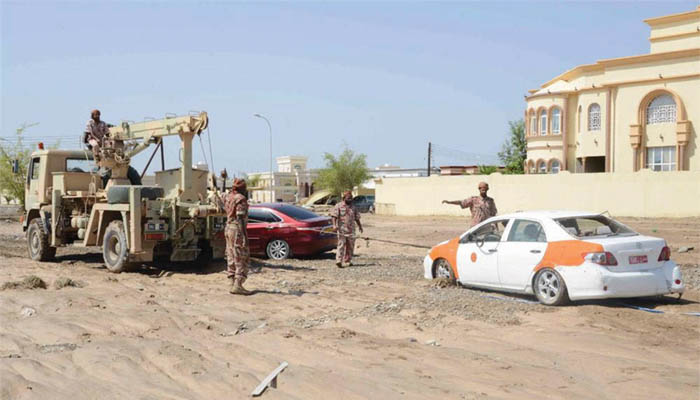

Muscat: Restoring basic services such as electricity and water, and providing the basic necessities to people affected by cyclone Shaheen are among the first priorities that need to be tackled by the ministerial committee formed to assess its impact.
The sector delegated with providing basic services has been directed, in coordination with the concerned authorities, to expedite the restoration of the damaged main and secondary roads. They were also instructed to take the necessary precautions for public safety when restoring electricity and communications networks.
Set up by His Majesty Sultan Haitham Bin Tarik to measure the damage caused by Shaheen, as well as direct the required reconstruction and relief measures, the committee recently held its first meeting under Finance Minister Sultan bin Salem Al Habsi and chairman of the Economic Committee of the Council of Ministers.
The meeting, which was held at the Royal Oman Police station in wilayat Suwaiq, also looked at the damage suffered by people’s homes and various properties across the governorates, during the cyclone. The committee also aims to provide various forms of support and assistance necessary to mitigate the impact of Shaheen at soon as possible.
The committee also discussed the work of the sectoral teams operating under the National Committee for Emergency Management, and took decisions that would prioritise protecting lives and quickly restoring normality to those directly affected.
During the meeting, it was decided that the public health sector would carry out emergency work to assess and deal with the health and epidemiological conditions, and to operate specific locations to collect and distribute food supplies and basic necessities to families, in coordination with the Omani Authority for Charitable Activities (OACA) and volunteer teams working in the affected areas.
The committee also conducted a field visit to inspect the initial damage in some areas affected by the cyclone.
“We are continuing to send emergency relief materials to be distributed to the affected people in the governorates of South and North Al Batinah,” Mohammed bin Hamoud Al Dhahli, chairman of the OACA, told Oman News Agency. “We announced a national campaign to collect and receive donations from individuals, institutions and merchants to help those affected by these exceptional climatic conditions.”
He announced that since the news of the cyclone was announced, the organisation had developed an action plan by forming a team of workers from all of its four branches, namely distribution, equipping warehouses with relief materials, loading them onto trucks, and dispatching convoys of aid where needed. These activities are carried out with the National Committee for Emergency Management.
During the past three days, cyclone Shaheen caused the death of 11 people. Searches are still underway for nine missing persons, and until noon on Tuesday, October 5, search and rescue teams have responded to 231 reports, during which they managed to save 654 people in different locations, of whom 57 were trapped in wadis, 66 were stuck inside their vehicles, and 91 more were unable to leave their homes, because of the weather conditions.
As part of the ongoing efforts, the Police Aviation yesterday conducted 138 operations of rescue, evacuation and airlifting, in addition to aerial surveillance of the affected areas. The Royal Oman Police (ROP) operations centre received more than 36,000 reports and opened new emergency lines to accommodate the rising number of reports.
The Sultan’s Armed Forces (SAF), the ROP, the Civil Defense and Ambulance Authority and civil sectors join hands in a collective search and mission.
Some roads are opened and citizens and residents are cautioned against approaching hazardous areas.
— With inputs from ONA